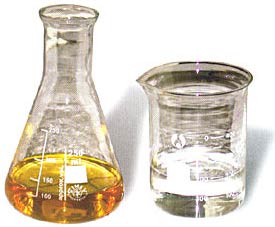Biotechnology breakthroughs can end the excess of glycerin in biodiesel
Rice engineers find a way to make ethanol, chemicals that are valuable from glycerin waste.
Along with US biodiesel products at every peak and record number of building new biodiesel processing plants. Industry is facing a threatening crisis for glycerin waste, a major byproduct of biodiesel. New findings from Rice University suggest a plausible answer to a bacterium that makes glycerin and produces ethanol, another popular biofuel.
'We have identified the states and metabolic processes that allow a bacterium, E. coli, to metabolize glycerin into ethanol,' said chemical engineer Ramon Gonzalez. also very effective. We estimate the operating costs for ethanol processing to be about 40% less than cup sleep. '
Gonzalez, an assistant professor of biochemistry and molecular biology, said: "The rapid growth of the biodiesel processing industry has created a waste of glycerin ." This redundancy forces glycerin producers such as Dow Chemical and Procter & Gamble to shut down factories, and some biodiesel producers cannot sell glycerin at all and instead have to pay for it. Go back to it.
 Gonzalez, said: 'A pound of glycerin is used to make 10 pounds of biodiesel, the business of biodiesel benefits very well, and so far glycerin is a very valuable commodity, face. goods that manufacturers look forward to selling to ensure profitability. '
Gonzalez, said: 'A pound of glycerin is used to make 10 pounds of biodiesel, the business of biodiesel benefits very well, and so far glycerin is a very valuable commodity, face. goods that manufacturers look forward to selling to ensure profitability. '
Global researchers are racing to find ways to turn glycerin waste into profit. Meanwhile, some are looking at the traditional chemical production process - seeking to catalyze reactions to turn glycerin into other chemicals. On the other hand, including Gonzalez, the focus is on biotransformation. In biotransformation, researchers create a microorganism that can eat certain chemical processing materials and then release something useful . Many drugs are also made in this way, and the chemical processing industry is gradually looking to biological processing processes to make ' new soldiers ', and sometimes cheaper, replacing for chemical production process.
In a June issue of the journal Current Opinion in Biotechnology, Gonzalez notes that very few microorganisms are able to classify glycerin in an oxygen-free environment. This non-oxygen process - known as anaerobic fermentation - is the most widely used and cost-effective process for biotransformation.
Gonzalez said: 'We are confident that our findings will allow the use of E. coli to produce ethanol and other products in anaerobic microbial environment from glycerin, with profits. High and low cost, rather than being used like glucose and xylose based on common sugar processing ingredients. '
LOCAL
- Non-clean Biodiesel will damage the engine
- Hong Kong produces biodiesel from waste oil
- Russia successfully separated biodiesel from mud
- Argentina produces biofuels from marine algae
- 7 medical breakthroughs in 2017 make sure you are admiring
- Many new studies at biotechnology conferences
- Cuba started piloting biodiesel production from the fence
- Diesel from chicken fat
- Malaysia produces biodiesel
- 5 world medicine breakthroughs 2009
- Cuba biotechnology has great development potential
- Exploiting diesel from wild plants
 Why do potatoes have eyes?
Why do potatoes have eyes? 'Tragedy' the world's largest carnivorous life: Death becomes ... public toilet
'Tragedy' the world's largest carnivorous life: Death becomes ... public toilet Tomatoes were once considered 'poisonous' for 200 years
Tomatoes were once considered 'poisonous' for 200 years Detecting microscopic parasites on human face
Detecting microscopic parasites on human face